Home-Based Care for Elderly with Dementia: An Essay
VerifiedAdded on 2022/08/13
|11
|2980
|11
Essay
AI Summary
This essay examines the critical importance of home-based care for elderly individuals, especially those suffering from dementia. It highlights the various challenges faced by these patients, such as difficulties in daily activities, wandering, and potential for falls, emphasizing how a home environment can be more beneficial compared to hospital settings. The essay also details the crucial role of nurses in providing comprehensive care, including assessing home safety, employing effective communication strategies, and coordinating multidisciplinary teams involving social workers, physiotherapists, and neuropsychologists. Ethical and legal considerations, such as family-centered care and adherence to beneficence and non-maleficence principles, are also discussed, along with potential challenges like patient non-cooperation. The essay underscores the need for nurses to manage medication, prevent wandering, and ensure a safe home environment to improve the quality of life for elderly individuals with dementia.

Running head: CARING ELDERLY PEOPLE AT HOME
Caring Elderly People at Home
Name of the Student
Name of the University
Author Note
Caring Elderly People at Home
Name of the Student
Name of the University
Author Note
Paraphrase This Document
Need a fresh take? Get an instant paraphrase of this document with our AI Paraphraser

1CARING ELDERLY PEOPLE AT HOME
Introduction
In recent times it is reported that the elderly people are more vulnerable population
around the world and so it is very crucial to take care for them properly. In this context, it can
be stated that the patients who are having any type of disease condition are facing more
problems compared to other people of their same age groups. In this context, it can be stated
that the issue of dementia is one of the most common problems for the elderly people as with
the advancement of age, the chance of getting dementia is enhanced and so the cases of
dementia are mostly reported among the elderly people of the society. Moreover, along with
the advancement of the medical sciences, the overall life expectancy rate of the elderly
people are also enhancing and so it has become very relevant to provide health care facilities
to the elderly people at their home as it is believed that the application of home based care is
very effective in improving the quality of life of the elderly population and along with this it
is also reported that such home based care also improves the overall wellbeing of the
individuals having problems like dementia.
In this essay, the importance of home based care for the elderly is discussed along
with the role of nurses in providing care to the patients in a brief manner.
Rationale for Caring Elderly People with Dementia
In various studies, it is observed that the elderly people suffering from dementia have
various types of problems in their activities of daily livings and so it is very important to take
care of those people properly in order to improve the quality of life. It is reported that
dementia is not a single disease and it is capable of affecting various brain region of the
individuals. As a consequence of this they face various health related problems. In this
context, it can be stated that, one of the primary problem of the dementia patient is apraxia
that is difficulties in performances of various motor activities, inability to comprehend and as
Introduction
In recent times it is reported that the elderly people are more vulnerable population
around the world and so it is very crucial to take care for them properly. In this context, it can
be stated that the patients who are having any type of disease condition are facing more
problems compared to other people of their same age groups. In this context, it can be stated
that the issue of dementia is one of the most common problems for the elderly people as with
the advancement of age, the chance of getting dementia is enhanced and so the cases of
dementia are mostly reported among the elderly people of the society. Moreover, along with
the advancement of the medical sciences, the overall life expectancy rate of the elderly
people are also enhancing and so it has become very relevant to provide health care facilities
to the elderly people at their home as it is believed that the application of home based care is
very effective in improving the quality of life of the elderly population and along with this it
is also reported that such home based care also improves the overall wellbeing of the
individuals having problems like dementia.
In this essay, the importance of home based care for the elderly is discussed along
with the role of nurses in providing care to the patients in a brief manner.
Rationale for Caring Elderly People with Dementia
In various studies, it is observed that the elderly people suffering from dementia have
various types of problems in their activities of daily livings and so it is very important to take
care of those people properly in order to improve the quality of life. It is reported that
dementia is not a single disease and it is capable of affecting various brain region of the
individuals. As a consequence of this they face various health related problems. In this
context, it can be stated that, one of the primary problem of the dementia patient is apraxia
that is difficulties in performances of various motor activities, inability to comprehend and as
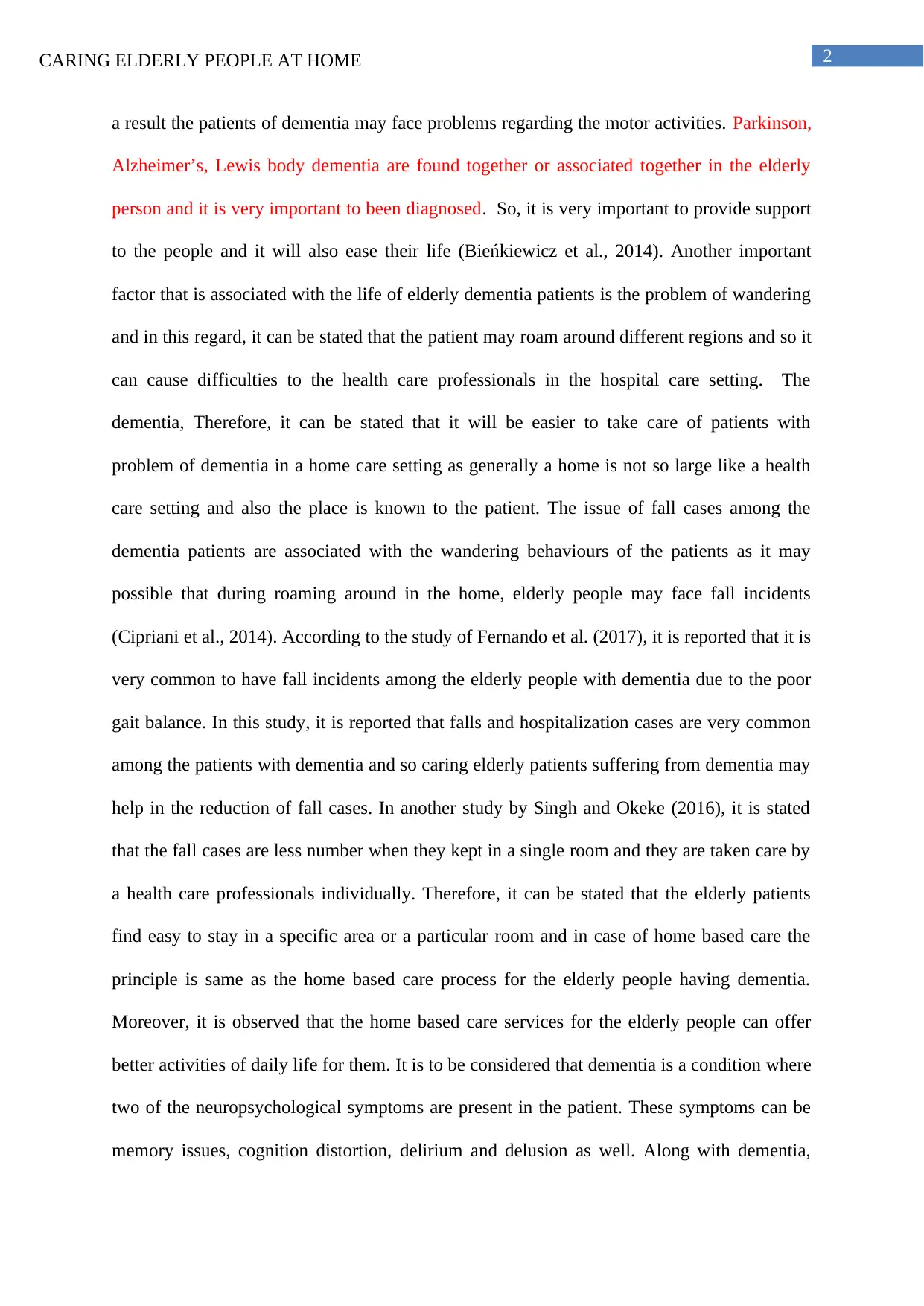
2CARING ELDERLY PEOPLE AT HOME
a result the patients of dementia may face problems regarding the motor activities. Parkinson,
Alzheimer’s, Lewis body dementia are found together or associated together in the elderly
person and it is very important to been diagnosed. So, it is very important to provide support
to the people and it will also ease their life (Bieńkiewicz et al., 2014). Another important
factor that is associated with the life of elderly dementia patients is the problem of wandering
and in this regard, it can be stated that the patient may roam around different regions and so it
can cause difficulties to the health care professionals in the hospital care setting. The
dementia, Therefore, it can be stated that it will be easier to take care of patients with
problem of dementia in a home care setting as generally a home is not so large like a health
care setting and also the place is known to the patient. The issue of fall cases among the
dementia patients are associated with the wandering behaviours of the patients as it may
possible that during roaming around in the home, elderly people may face fall incidents
(Cipriani et al., 2014). According to the study of Fernando et al. (2017), it is reported that it is
very common to have fall incidents among the elderly people with dementia due to the poor
gait balance. In this study, it is reported that falls and hospitalization cases are very common
among the patients with dementia and so caring elderly patients suffering from dementia may
help in the reduction of fall cases. In another study by Singh and Okeke (2016), it is stated
that the fall cases are less number when they kept in a single room and they are taken care by
a health care professionals individually. Therefore, it can be stated that the elderly patients
find easy to stay in a specific area or a particular room and in case of home based care the
principle is same as the home based care process for the elderly people having dementia.
Moreover, it is observed that the home based care services for the elderly people can offer
better activities of daily life for them. It is to be considered that dementia is a condition where
two of the neuropsychological symptoms are present in the patient. These symptoms can be
memory issues, cognition distortion, delirium and delusion as well. Along with dementia,
a result the patients of dementia may face problems regarding the motor activities. Parkinson,
Alzheimer’s, Lewis body dementia are found together or associated together in the elderly
person and it is very important to been diagnosed. So, it is very important to provide support
to the people and it will also ease their life (Bieńkiewicz et al., 2014). Another important
factor that is associated with the life of elderly dementia patients is the problem of wandering
and in this regard, it can be stated that the patient may roam around different regions and so it
can cause difficulties to the health care professionals in the hospital care setting. The
dementia, Therefore, it can be stated that it will be easier to take care of patients with
problem of dementia in a home care setting as generally a home is not so large like a health
care setting and also the place is known to the patient. The issue of fall cases among the
dementia patients are associated with the wandering behaviours of the patients as it may
possible that during roaming around in the home, elderly people may face fall incidents
(Cipriani et al., 2014). According to the study of Fernando et al. (2017), it is reported that it is
very common to have fall incidents among the elderly people with dementia due to the poor
gait balance. In this study, it is reported that falls and hospitalization cases are very common
among the patients with dementia and so caring elderly patients suffering from dementia may
help in the reduction of fall cases. In another study by Singh and Okeke (2016), it is stated
that the fall cases are less number when they kept in a single room and they are taken care by
a health care professionals individually. Therefore, it can be stated that the elderly patients
find easy to stay in a specific area or a particular room and in case of home based care the
principle is same as the home based care process for the elderly people having dementia.
Moreover, it is observed that the home based care services for the elderly people can offer
better activities of daily life for them. It is to be considered that dementia is a condition where
two of the neuropsychological symptoms are present in the patient. These symptoms can be
memory issues, cognition distortion, delirium and delusion as well. Along with dementia,
⊘ This is a preview!⊘
Do you want full access?
Subscribe today to unlock all pages.

Trusted by 1+ million students worldwide
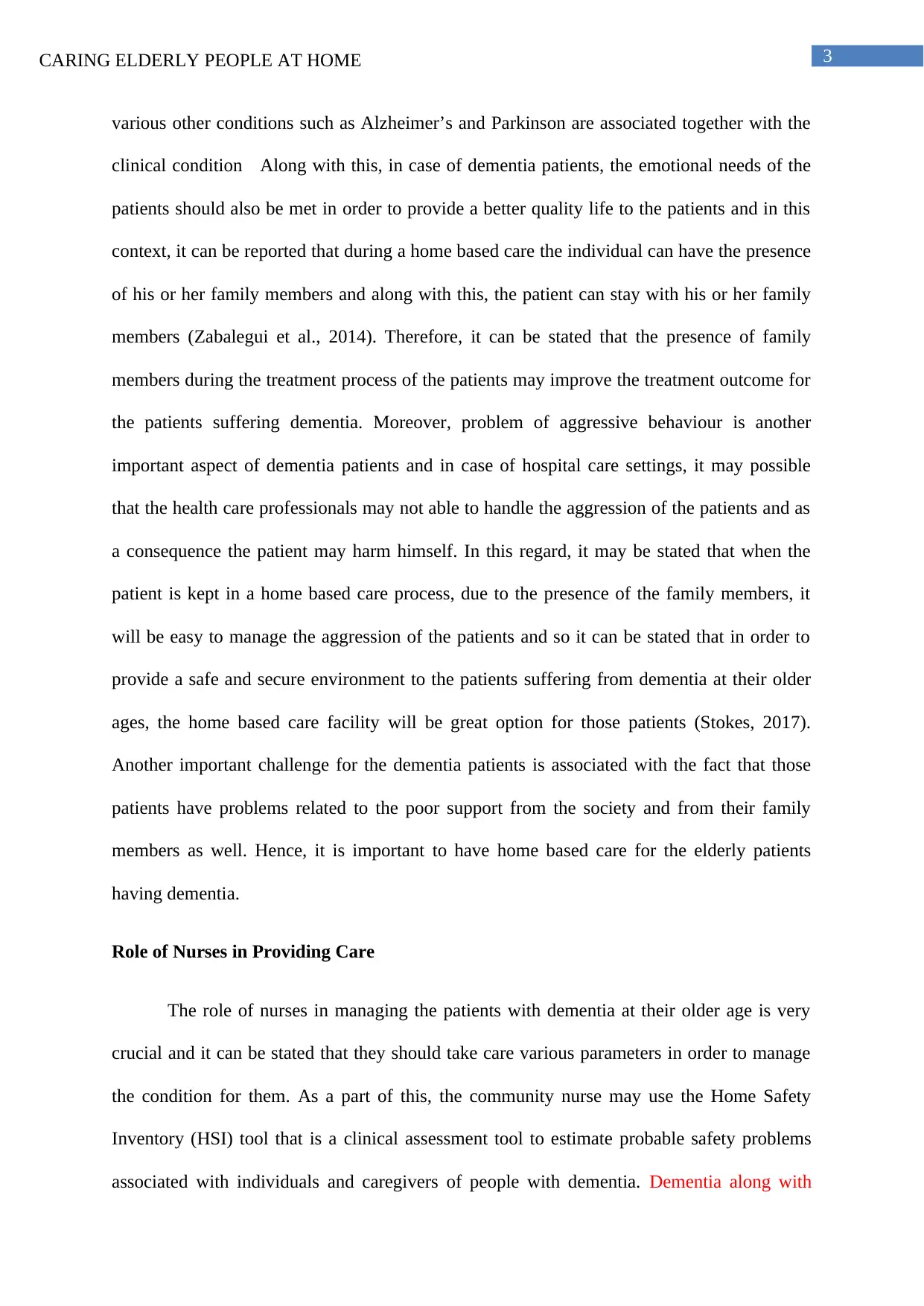
3CARING ELDERLY PEOPLE AT HOME
various other conditions such as Alzheimer’s and Parkinson are associated together with the
clinical condition Along with this, in case of dementia patients, the emotional needs of the
patients should also be met in order to provide a better quality life to the patients and in this
context, it can be reported that during a home based care the individual can have the presence
of his or her family members and along with this, the patient can stay with his or her family
members (Zabalegui et al., 2014). Therefore, it can be stated that the presence of family
members during the treatment process of the patients may improve the treatment outcome for
the patients suffering dementia. Moreover, problem of aggressive behaviour is another
important aspect of dementia patients and in case of hospital care settings, it may possible
that the health care professionals may not able to handle the aggression of the patients and as
a consequence the patient may harm himself. In this regard, it may be stated that when the
patient is kept in a home based care process, due to the presence of the family members, it
will be easy to manage the aggression of the patients and so it can be stated that in order to
provide a safe and secure environment to the patients suffering from dementia at their older
ages, the home based care facility will be great option for those patients (Stokes, 2017).
Another important challenge for the dementia patients is associated with the fact that those
patients have problems related to the poor support from the society and from their family
members as well. Hence, it is important to have home based care for the elderly patients
having dementia.
Role of Nurses in Providing Care
The role of nurses in managing the patients with dementia at their older age is very
crucial and it can be stated that they should take care various parameters in order to manage
the condition for them. As a part of this, the community nurse may use the Home Safety
Inventory (HSI) tool that is a clinical assessment tool to estimate probable safety problems
associated with individuals and caregivers of people with dementia. Dementia along with
various other conditions such as Alzheimer’s and Parkinson are associated together with the
clinical condition Along with this, in case of dementia patients, the emotional needs of the
patients should also be met in order to provide a better quality life to the patients and in this
context, it can be reported that during a home based care the individual can have the presence
of his or her family members and along with this, the patient can stay with his or her family
members (Zabalegui et al., 2014). Therefore, it can be stated that the presence of family
members during the treatment process of the patients may improve the treatment outcome for
the patients suffering dementia. Moreover, problem of aggressive behaviour is another
important aspect of dementia patients and in case of hospital care settings, it may possible
that the health care professionals may not able to handle the aggression of the patients and as
a consequence the patient may harm himself. In this regard, it may be stated that when the
patient is kept in a home based care process, due to the presence of the family members, it
will be easy to manage the aggression of the patients and so it can be stated that in order to
provide a safe and secure environment to the patients suffering from dementia at their older
ages, the home based care facility will be great option for those patients (Stokes, 2017).
Another important challenge for the dementia patients is associated with the fact that those
patients have problems related to the poor support from the society and from their family
members as well. Hence, it is important to have home based care for the elderly patients
having dementia.
Role of Nurses in Providing Care
The role of nurses in managing the patients with dementia at their older age is very
crucial and it can be stated that they should take care various parameters in order to manage
the condition for them. As a part of this, the community nurse may use the Home Safety
Inventory (HSI) tool that is a clinical assessment tool to estimate probable safety problems
associated with individuals and caregivers of people with dementia. Dementia along with
Paraphrase This Document
Need a fresh take? Get an instant paraphrase of this document with our AI Paraphraser
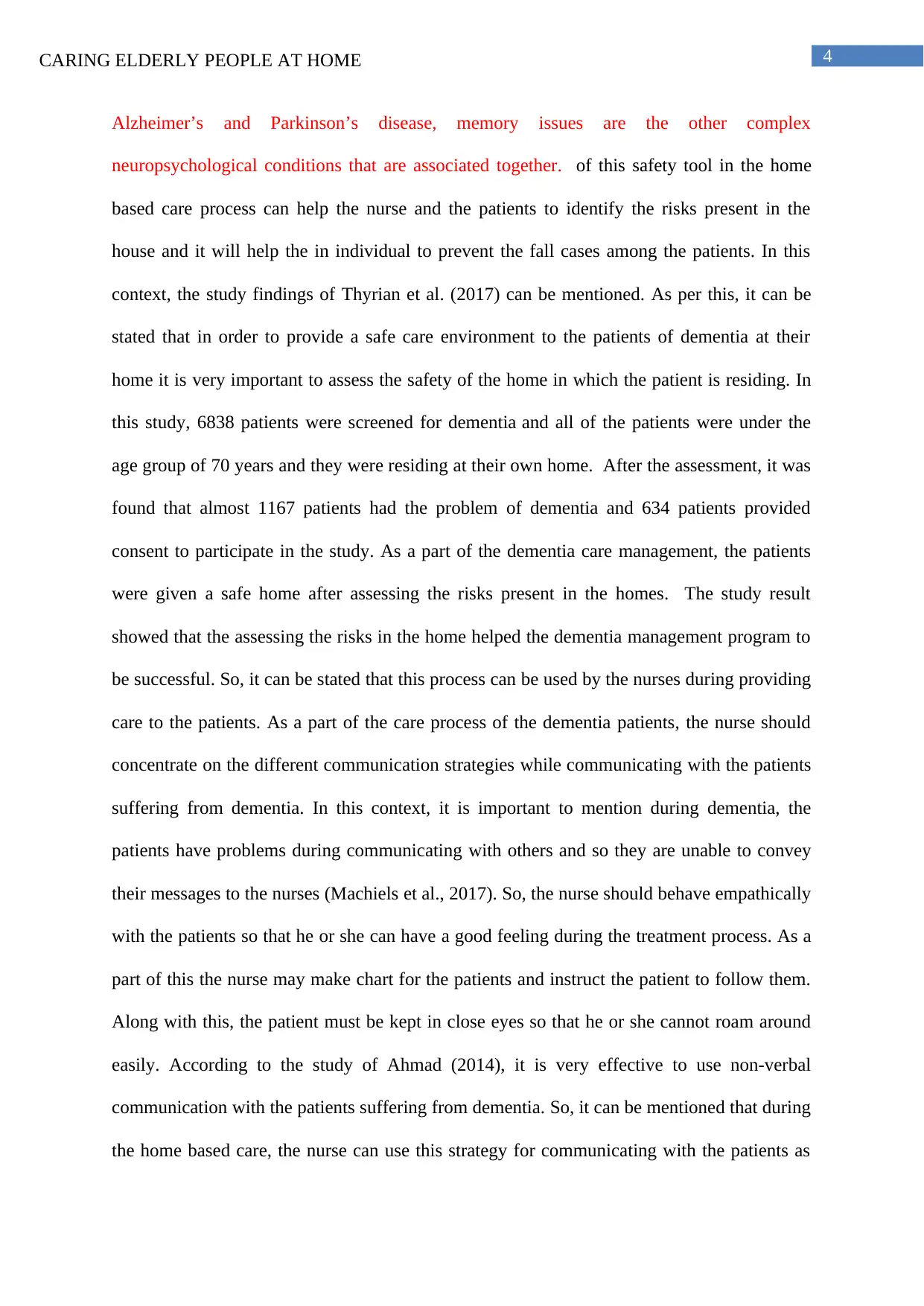
4CARING ELDERLY PEOPLE AT HOME
Alzheimer’s and Parkinson’s disease, memory issues are the other complex
neuropsychological conditions that are associated together. of this safety tool in the home
based care process can help the nurse and the patients to identify the risks present in the
house and it will help the in individual to prevent the fall cases among the patients. In this
context, the study findings of Thyrian et al. (2017) can be mentioned. As per this, it can be
stated that in order to provide a safe care environment to the patients of dementia at their
home it is very important to assess the safety of the home in which the patient is residing. In
this study, 6838 patients were screened for dementia and all of the patients were under the
age group of 70 years and they were residing at their own home. After the assessment, it was
found that almost 1167 patients had the problem of dementia and 634 patients provided
consent to participate in the study. As a part of the dementia care management, the patients
were given a safe home after assessing the risks present in the homes. The study result
showed that the assessing the risks in the home helped the dementia management program to
be successful. So, it can be stated that this process can be used by the nurses during providing
care to the patients. As a part of the care process of the dementia patients, the nurse should
concentrate on the different communication strategies while communicating with the patients
suffering from dementia. In this context, it is important to mention during dementia, the
patients have problems during communicating with others and so they are unable to convey
their messages to the nurses (Machiels et al., 2017). So, the nurse should behave empathically
with the patients so that he or she can have a good feeling during the treatment process. As a
part of this the nurse may make chart for the patients and instruct the patient to follow them.
Along with this, the patient must be kept in close eyes so that he or she cannot roam around
easily. According to the study of Ahmad (2014), it is very effective to use non-verbal
communication with the patients suffering from dementia. So, it can be mentioned that during
the home based care, the nurse can use this strategy for communicating with the patients as
Alzheimer’s and Parkinson’s disease, memory issues are the other complex
neuropsychological conditions that are associated together. of this safety tool in the home
based care process can help the nurse and the patients to identify the risks present in the
house and it will help the in individual to prevent the fall cases among the patients. In this
context, the study findings of Thyrian et al. (2017) can be mentioned. As per this, it can be
stated that in order to provide a safe care environment to the patients of dementia at their
home it is very important to assess the safety of the home in which the patient is residing. In
this study, 6838 patients were screened for dementia and all of the patients were under the
age group of 70 years and they were residing at their own home. After the assessment, it was
found that almost 1167 patients had the problem of dementia and 634 patients provided
consent to participate in the study. As a part of the dementia care management, the patients
were given a safe home after assessing the risks present in the homes. The study result
showed that the assessing the risks in the home helped the dementia management program to
be successful. So, it can be stated that this process can be used by the nurses during providing
care to the patients. As a part of the care process of the dementia patients, the nurse should
concentrate on the different communication strategies while communicating with the patients
suffering from dementia. In this context, it is important to mention during dementia, the
patients have problems during communicating with others and so they are unable to convey
their messages to the nurses (Machiels et al., 2017). So, the nurse should behave empathically
with the patients so that he or she can have a good feeling during the treatment process. As a
part of this the nurse may make chart for the patients and instruct the patient to follow them.
Along with this, the patient must be kept in close eyes so that he or she cannot roam around
easily. According to the study of Ahmad (2014), it is very effective to use non-verbal
communication with the patients suffering from dementia. So, it can be mentioned that during
the home based care, the nurse can use this strategy for communicating with the patients as
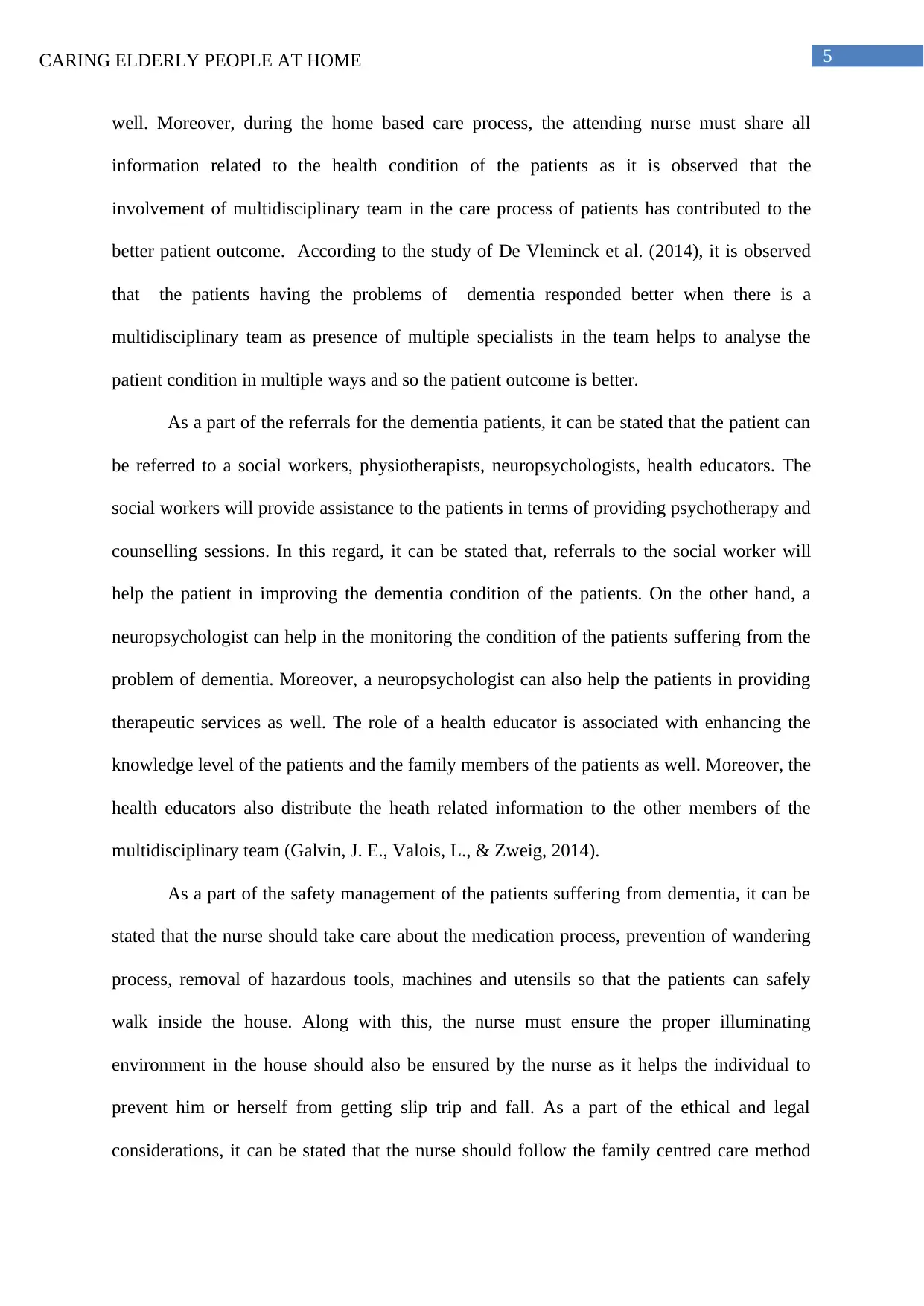
5CARING ELDERLY PEOPLE AT HOME
well. Moreover, during the home based care process, the attending nurse must share all
information related to the health condition of the patients as it is observed that the
involvement of multidisciplinary team in the care process of patients has contributed to the
better patient outcome. According to the study of De Vleminck et al. (2014), it is observed
that the patients having the problems of dementia responded better when there is a
multidisciplinary team as presence of multiple specialists in the team helps to analyse the
patient condition in multiple ways and so the patient outcome is better.
As a part of the referrals for the dementia patients, it can be stated that the patient can
be referred to a social workers, physiotherapists, neuropsychologists, health educators. The
social workers will provide assistance to the patients in terms of providing psychotherapy and
counselling sessions. In this regard, it can be stated that, referrals to the social worker will
help the patient in improving the dementia condition of the patients. On the other hand, a
neuropsychologist can help in the monitoring the condition of the patients suffering from the
problem of dementia. Moreover, a neuropsychologist can also help the patients in providing
therapeutic services as well. The role of a health educator is associated with enhancing the
knowledge level of the patients and the family members of the patients as well. Moreover, the
health educators also distribute the heath related information to the other members of the
multidisciplinary team (Galvin, J. E., Valois, L., & Zweig, 2014).
As a part of the safety management of the patients suffering from dementia, it can be
stated that the nurse should take care about the medication process, prevention of wandering
process, removal of hazardous tools, machines and utensils so that the patients can safely
walk inside the house. Along with this, the nurse must ensure the proper illuminating
environment in the house should also be ensured by the nurse as it helps the individual to
prevent him or herself from getting slip trip and fall. As a part of the ethical and legal
considerations, it can be stated that the nurse should follow the family centred care method
well. Moreover, during the home based care process, the attending nurse must share all
information related to the health condition of the patients as it is observed that the
involvement of multidisciplinary team in the care process of patients has contributed to the
better patient outcome. According to the study of De Vleminck et al. (2014), it is observed
that the patients having the problems of dementia responded better when there is a
multidisciplinary team as presence of multiple specialists in the team helps to analyse the
patient condition in multiple ways and so the patient outcome is better.
As a part of the referrals for the dementia patients, it can be stated that the patient can
be referred to a social workers, physiotherapists, neuropsychologists, health educators. The
social workers will provide assistance to the patients in terms of providing psychotherapy and
counselling sessions. In this regard, it can be stated that, referrals to the social worker will
help the patient in improving the dementia condition of the patients. On the other hand, a
neuropsychologist can help in the monitoring the condition of the patients suffering from the
problem of dementia. Moreover, a neuropsychologist can also help the patients in providing
therapeutic services as well. The role of a health educator is associated with enhancing the
knowledge level of the patients and the family members of the patients as well. Moreover, the
health educators also distribute the heath related information to the other members of the
multidisciplinary team (Galvin, J. E., Valois, L., & Zweig, 2014).
As a part of the safety management of the patients suffering from dementia, it can be
stated that the nurse should take care about the medication process, prevention of wandering
process, removal of hazardous tools, machines and utensils so that the patients can safely
walk inside the house. Along with this, the nurse must ensure the proper illuminating
environment in the house should also be ensured by the nurse as it helps the individual to
prevent him or herself from getting slip trip and fall. As a part of the ethical and legal
considerations, it can be stated that the nurse should follow the family centred care method
⊘ This is a preview!⊘
Do you want full access?
Subscribe today to unlock all pages.

Trusted by 1+ million students worldwide
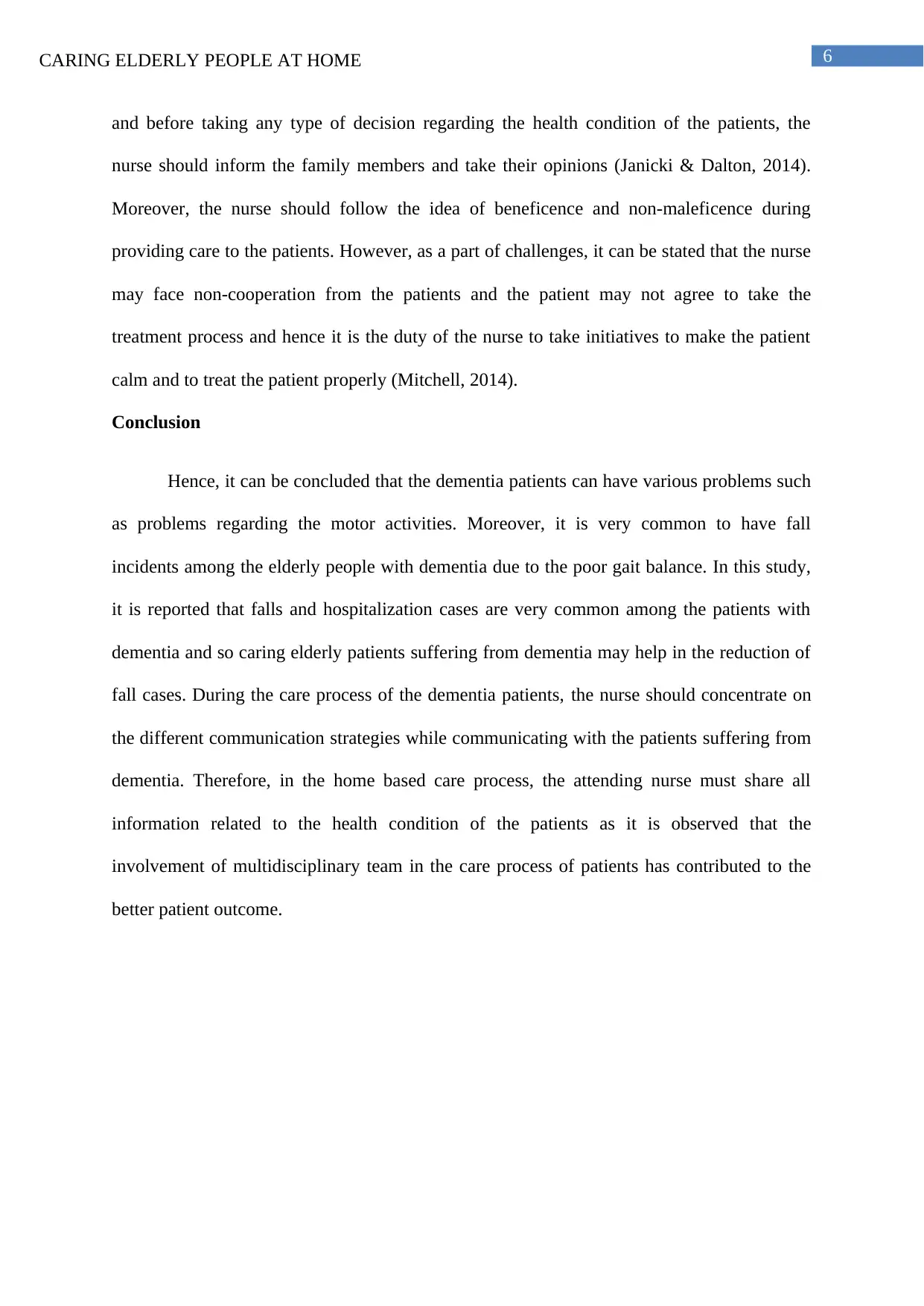
6CARING ELDERLY PEOPLE AT HOME
and before taking any type of decision regarding the health condition of the patients, the
nurse should inform the family members and take their opinions (Janicki & Dalton, 2014).
Moreover, the nurse should follow the idea of beneficence and non-maleficence during
providing care to the patients. However, as a part of challenges, it can be stated that the nurse
may face non-cooperation from the patients and the patient may not agree to take the
treatment process and hence it is the duty of the nurse to take initiatives to make the patient
calm and to treat the patient properly (Mitchell, 2014).
Conclusion
Hence, it can be concluded that the dementia patients can have various problems such
as problems regarding the motor activities. Moreover, it is very common to have fall
incidents among the elderly people with dementia due to the poor gait balance. In this study,
it is reported that falls and hospitalization cases are very common among the patients with
dementia and so caring elderly patients suffering from dementia may help in the reduction of
fall cases. During the care process of the dementia patients, the nurse should concentrate on
the different communication strategies while communicating with the patients suffering from
dementia. Therefore, in the home based care process, the attending nurse must share all
information related to the health condition of the patients as it is observed that the
involvement of multidisciplinary team in the care process of patients has contributed to the
better patient outcome.
and before taking any type of decision regarding the health condition of the patients, the
nurse should inform the family members and take their opinions (Janicki & Dalton, 2014).
Moreover, the nurse should follow the idea of beneficence and non-maleficence during
providing care to the patients. However, as a part of challenges, it can be stated that the nurse
may face non-cooperation from the patients and the patient may not agree to take the
treatment process and hence it is the duty of the nurse to take initiatives to make the patient
calm and to treat the patient properly (Mitchell, 2014).
Conclusion
Hence, it can be concluded that the dementia patients can have various problems such
as problems regarding the motor activities. Moreover, it is very common to have fall
incidents among the elderly people with dementia due to the poor gait balance. In this study,
it is reported that falls and hospitalization cases are very common among the patients with
dementia and so caring elderly patients suffering from dementia may help in the reduction of
fall cases. During the care process of the dementia patients, the nurse should concentrate on
the different communication strategies while communicating with the patients suffering from
dementia. Therefore, in the home based care process, the attending nurse must share all
information related to the health condition of the patients as it is observed that the
involvement of multidisciplinary team in the care process of patients has contributed to the
better patient outcome.
Paraphrase This Document
Need a fresh take? Get an instant paraphrase of this document with our AI Paraphraser
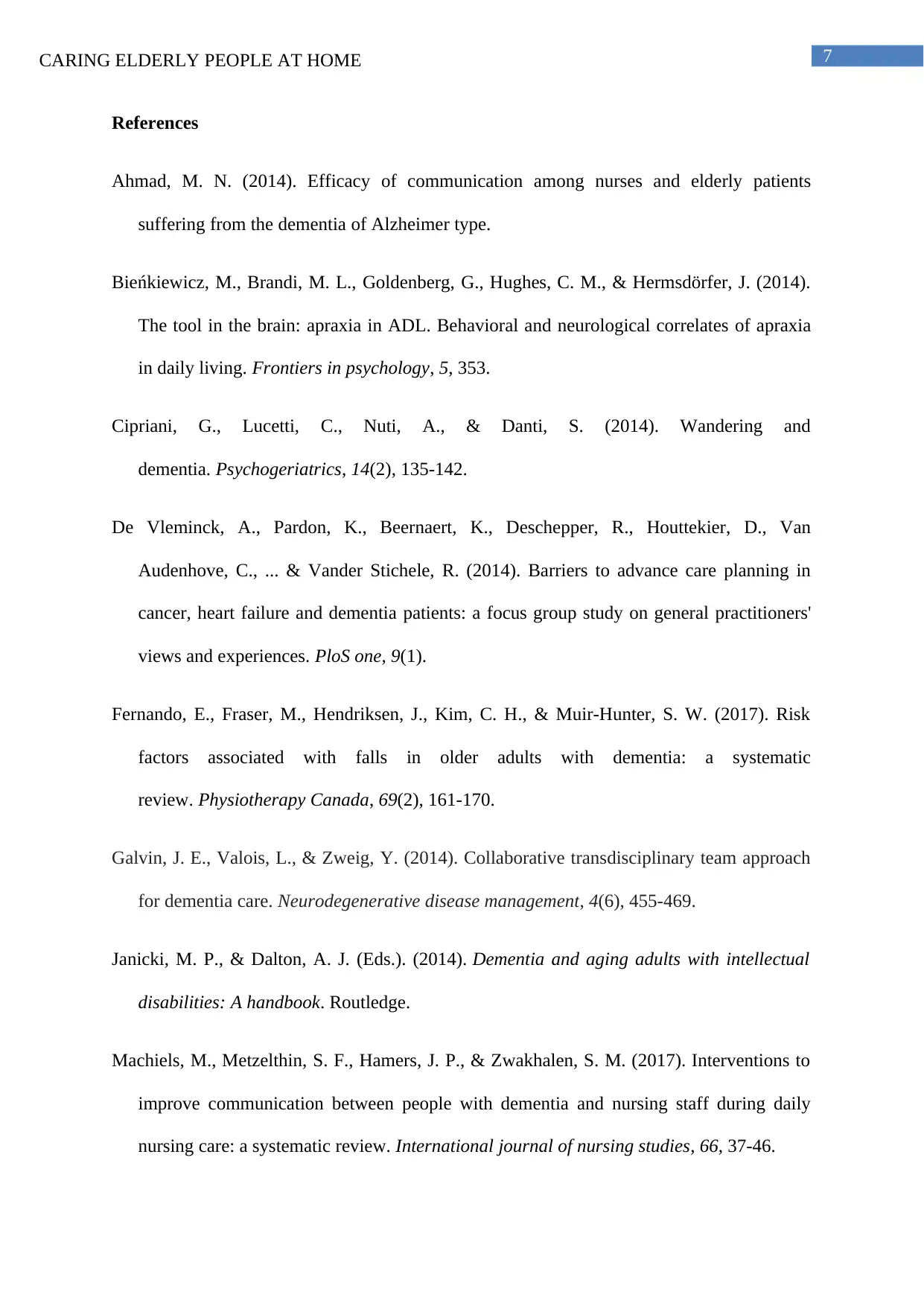
7CARING ELDERLY PEOPLE AT HOME
References
Ahmad, M. N. (2014). Efficacy of communication among nurses and elderly patients
suffering from the dementia of Alzheimer type.
Bieńkiewicz, M., Brandi, M. L., Goldenberg, G., Hughes, C. M., & Hermsdörfer, J. (2014).
The tool in the brain: apraxia in ADL. Behavioral and neurological correlates of apraxia
in daily living. Frontiers in psychology, 5, 353.
Cipriani, G., Lucetti, C., Nuti, A., & Danti, S. (2014). Wandering and
dementia. Psychogeriatrics, 14(2), 135-142.
De Vleminck, A., Pardon, K., Beernaert, K., Deschepper, R., Houttekier, D., Van
Audenhove, C., ... & Vander Stichele, R. (2014). Barriers to advance care planning in
cancer, heart failure and dementia patients: a focus group study on general practitioners'
views and experiences. PloS one, 9(1).
Fernando, E., Fraser, M., Hendriksen, J., Kim, C. H., & Muir-Hunter, S. W. (2017). Risk
factors associated with falls in older adults with dementia: a systematic
review. Physiotherapy Canada, 69(2), 161-170.
Galvin, J. E., Valois, L., & Zweig, Y. (2014). Collaborative transdisciplinary team approach
for dementia care. Neurodegenerative disease management, 4(6), 455-469.
Janicki, M. P., & Dalton, A. J. (Eds.). (2014). Dementia and aging adults with intellectual
disabilities: A handbook. Routledge.
Machiels, M., Metzelthin, S. F., Hamers, J. P., & Zwakhalen, S. M. (2017). Interventions to
improve communication between people with dementia and nursing staff during daily
nursing care: a systematic review. International journal of nursing studies, 66, 37-46.
References
Ahmad, M. N. (2014). Efficacy of communication among nurses and elderly patients
suffering from the dementia of Alzheimer type.
Bieńkiewicz, M., Brandi, M. L., Goldenberg, G., Hughes, C. M., & Hermsdörfer, J. (2014).
The tool in the brain: apraxia in ADL. Behavioral and neurological correlates of apraxia
in daily living. Frontiers in psychology, 5, 353.
Cipriani, G., Lucetti, C., Nuti, A., & Danti, S. (2014). Wandering and
dementia. Psychogeriatrics, 14(2), 135-142.
De Vleminck, A., Pardon, K., Beernaert, K., Deschepper, R., Houttekier, D., Van
Audenhove, C., ... & Vander Stichele, R. (2014). Barriers to advance care planning in
cancer, heart failure and dementia patients: a focus group study on general practitioners'
views and experiences. PloS one, 9(1).
Fernando, E., Fraser, M., Hendriksen, J., Kim, C. H., & Muir-Hunter, S. W. (2017). Risk
factors associated with falls in older adults with dementia: a systematic
review. Physiotherapy Canada, 69(2), 161-170.
Galvin, J. E., Valois, L., & Zweig, Y. (2014). Collaborative transdisciplinary team approach
for dementia care. Neurodegenerative disease management, 4(6), 455-469.
Janicki, M. P., & Dalton, A. J. (Eds.). (2014). Dementia and aging adults with intellectual
disabilities: A handbook. Routledge.
Machiels, M., Metzelthin, S. F., Hamers, J. P., & Zwakhalen, S. M. (2017). Interventions to
improve communication between people with dementia and nursing staff during daily
nursing care: a systematic review. International journal of nursing studies, 66, 37-46.
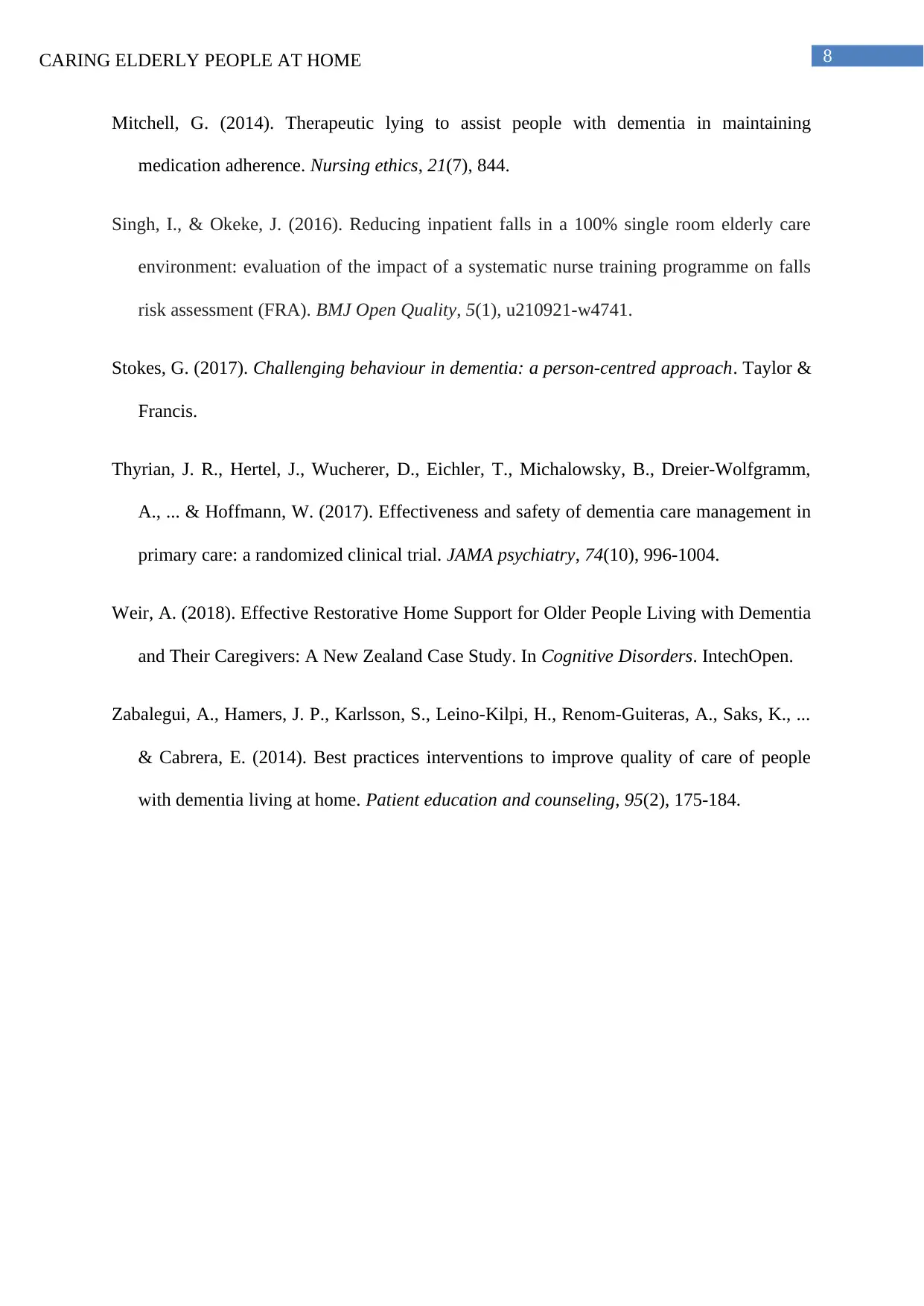
8CARING ELDERLY PEOPLE AT HOME
Mitchell, G. (2014). Therapeutic lying to assist people with dementia in maintaining
medication adherence. Nursing ethics, 21(7), 844.
Singh, I., & Okeke, J. (2016). Reducing inpatient falls in a 100% single room elderly care
environment: evaluation of the impact of a systematic nurse training programme on falls
risk assessment (FRA). BMJ Open Quality, 5(1), u210921-w4741.
Stokes, G. (2017). Challenging behaviour in dementia: a person-centred approach. Taylor &
Francis.
Thyrian, J. R., Hertel, J., Wucherer, D., Eichler, T., Michalowsky, B., Dreier-Wolfgramm,
A., ... & Hoffmann, W. (2017). Effectiveness and safety of dementia care management in
primary care: a randomized clinical trial. JAMA psychiatry, 74(10), 996-1004.
Weir, A. (2018). Effective Restorative Home Support for Older People Living with Dementia
and Their Caregivers: A New Zealand Case Study. In Cognitive Disorders. IntechOpen.
Zabalegui, A., Hamers, J. P., Karlsson, S., Leino-Kilpi, H., Renom-Guiteras, A., Saks, K., ...
& Cabrera, E. (2014). Best practices interventions to improve quality of care of people
with dementia living at home. Patient education and counseling, 95(2), 175-184.
Mitchell, G. (2014). Therapeutic lying to assist people with dementia in maintaining
medication adherence. Nursing ethics, 21(7), 844.
Singh, I., & Okeke, J. (2016). Reducing inpatient falls in a 100% single room elderly care
environment: evaluation of the impact of a systematic nurse training programme on falls
risk assessment (FRA). BMJ Open Quality, 5(1), u210921-w4741.
Stokes, G. (2017). Challenging behaviour in dementia: a person-centred approach. Taylor &
Francis.
Thyrian, J. R., Hertel, J., Wucherer, D., Eichler, T., Michalowsky, B., Dreier-Wolfgramm,
A., ... & Hoffmann, W. (2017). Effectiveness and safety of dementia care management in
primary care: a randomized clinical trial. JAMA psychiatry, 74(10), 996-1004.
Weir, A. (2018). Effective Restorative Home Support for Older People Living with Dementia
and Their Caregivers: A New Zealand Case Study. In Cognitive Disorders. IntechOpen.
Zabalegui, A., Hamers, J. P., Karlsson, S., Leino-Kilpi, H., Renom-Guiteras, A., Saks, K., ...
& Cabrera, E. (2014). Best practices interventions to improve quality of care of people
with dementia living at home. Patient education and counseling, 95(2), 175-184.
⊘ This is a preview!⊘
Do you want full access?
Subscribe today to unlock all pages.

Trusted by 1+ million students worldwide

9CARING ELDERLY PEOPLE AT HOME
Paraphrase This Document
Need a fresh take? Get an instant paraphrase of this document with our AI Paraphraser

10CARING ELDERLY PEOPLE AT HOME
1 out of 11
Related Documents
Your All-in-One AI-Powered Toolkit for Academic Success.
+13062052269
info@desklib.com
Available 24*7 on WhatsApp / Email
![[object Object]](/_next/static/media/star-bottom.7253800d.svg)
Unlock your academic potential
Copyright © 2020–2026 A2Z Services. All Rights Reserved. Developed and managed by ZUCOL.





